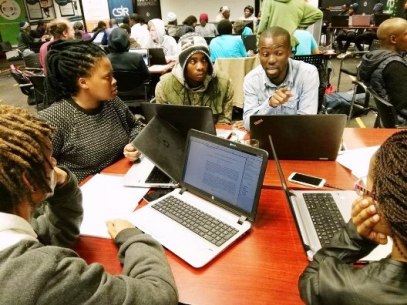By Jessica Hawkey, Managing Director of redAcademy
Young people are struggling to find jobs, while businesses can’t get the skills they need to grow. That’s why technology education is being pushed out of academic siloes to support young talent and help them access world-class, practical and hands-on training.
RELATED: How Nigeria and rest of Africa can fill global IT skill gaps, Tunga
South Africa desperately lacks STEM-trained professionals, and without them, we are shortchanging our own economy’s potential for innovation and productivity. Simply importing foreign workers with IT skills, or outsourcing IT jobs abroad, won’t solve this situation. Rather, it’s time to take a hard look at our tech education capability, pull back from what’s not working, and double down on what is.
Industry struggling to keep up with pace of change
Meanwhile, the industry itself is struggling to keep up with the pace of change – with mega trends such as generative AI, blockchain, data science, and remote work reshaping the sector from the ground up. In this environment, expecting the usual training courses to still be relevant is a tough ask. Perhaps that’s why only half of IT graduates are considered fully prepared for immediate employment – and up to 65% of businesses are affected by the technology skills gap. And as we know, 4.8 million young people between 18 and 34 are unemployed – a statistic that in itself is unsustainable.
In the face of such an immense crisis, businesses have not been idle. Corporates routinely offer employee development programmes to their own staff to empower their existing teams to meet new demands, and are investing in industry-specific training, often in partnership with training providers, to develop their talent pipelines and secure skills in emerging technologies.
But we need to do more. By scaling up training initiatives with built-in flexibility and responsiveness to market needs, we can start to bridge the gap.
Skills Integration-as-a-Service (SIaaS) model
Here’s where the Skills Integration-as-a-Service (SIaaS) model used by redAcademy can offer a potential solution. This model integrates training with real-world work experience, so that graduates are work-ready and familiar with their future employers’ systems and processes.
Students at redAcademy benefit from learning in live work environments, with real projects for clients. They gain practical experience that bridges the gap between theory and application, and they graduate faster, too. redAcademy courses are completed in a year rather than three years or more at a traditional institution.
The redAcademy curriculum focuses on in-demand tech skills, with programs accredited by the Quality Council for Trades and Occupations (QCTO) in areas such as software development, software testing, data science, and test automation. And the academy plans to expand its offerings soon, adding courses in AI development and cybersecurity.
Tailoring training to future employers’ specific needs
This approach aims to tailor training to that of future employers’ specific needs, and academy students are trained on employers’ technology stacks and operational processes. As a result, graduates are able to hit the ground running and be productive from day one – possibly contributing to redAcademy’s 96% graduate placement rate.
redAcademy graduate Phophi Muravha credits the programme with giving her both technical expertise and soft skills. “It taught me how to present myself professionally in the workplace, use appropriate language in a corporate setting, and understand the value of building meaningful networks,” she says. “When I started working, I didn’t feel like I was beginning from scratch. I had a solid foundation, which allowed me to adapt to my professional environment more quickly.”
Women underrepresented in tech sector
Women are underrepresented in the tech sector – making up only 22 percent of AI professionals, for instance – but they likely represent the majority of technology end users, according to Alderman Theresa Uys, Mayco Member for Corporate Services at the City of Cape Town. That means training programmes which reduce the barriers to entry into the sector all the more important, not just for the economy but for inclusivity too.
“While our policy is generally to hire the best candidate for the job, it is clear that we have a responsibility to encourage women to enter the tech industry and capacitate them to apply for positions. This applies not only to the City of Cape Town, but across all our relationships. And it starts early, from school level. I would like to see far more young women being encouraged to take subjects that will lead to studies in the tech industry,” Uys said at an event.
Removing barriers to tech education
redAcademy’s efforts are motivated by a desire to solve youth unemployment, remove barriers to tech education, and provide future-ready workplace skills. With almost all students quickly finding jobs after graduating, it’s evident that this is a winning recipe.
This is where South Africa needs to double down. Providers like redAcademy need support, and investment, to scale up even further. By doing so, we can reap multiple benefits, such as facilitating emerging digital sectors, fostering innovation, and enhancing productivity and global competitiveness.
Those are the business benefits. The human value of providing good jobs in a growing sector is priceless, with entire families becoming more resilient as a result.






























